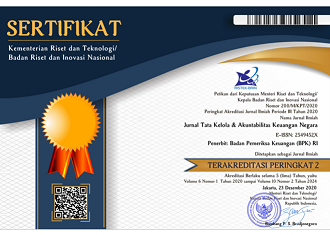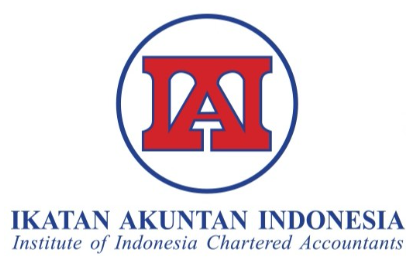Analysis of the RBA implementation and the preparation of an audit program at the Ministry of Villages, Development of Disadvantaged Regions and Transmigration
DOI:
https://doi.org/10.28986/jtaken.v7i1.489Keywords:
Risk based audit, agency theory, BPK, audit, audit programAbstract
Risk-Based Audit (RBA) is an audit method that applies a risk approach in its implementation. By applying the RBA method, it is expected that an audit can be performed effectively and efficiently, thus producing maximum audit results. This study aims to analyze the implementation of RBA upon audits conducted by The Audit Board of Indonesia (BPK). Furthermore, this study analyzes the preparation of an Audit Program in line with the previously determined RBA. The research framework uses Agency Theory which emphasizes the relationship between management and principal. To ensure that management does not perform any manipulation, an independent third party must conduct the audit. This study applied a qualitative research methodology with a case study approach at BPK. The author expects to dig deeper into the application and implementation of RBA within BPK by using the case study approach support by audit documents and interviews with BPK Audit Team. The results showed that the implementation, performance, and monitoring of RBA by the BPK Audit Team were in line with the instructions and guidelines set by BPK.
References
Arens, A. A., Elder, R. J., Beasley, M. S., & Hogan, C. E. (2017). Auditing and assurance service an integrated approach (16th ed.). Pearson Educations, Inc.
Bechara, M., & Kapoor, G. (2012). Maximizing the value of a risk-based audit plan. The CPA Journal, 82(3), 28–30.
BPK RI. (2012). Petunjuk Teknis Pemahaman dan Pengujian Sistem Pengendalian Internal Pemeriksaan Keuangan, Pub. L. No. Keputusan BPK RI Nomor 2/K/I-XIII.2/7/2012 (Technical Instruction of Understanding and Assessing Internal Control System, Pub. L. No. BPK RI Decree Number 2/K/I-XIII.2/7/2012). Jakarta: BPK RI.
BPK RI. (2015). Pedoman Manajemen Pemeriksaan, Pub. L. No. Keputusan BPK RI Nomor 5/K/I-XIII.2/10/2015 (Audit Management Guidelines, Pub. L. No. BPK RI Decree Number 5/K/I-XIII.2/10/2015). Jakarta: BPK RI.
BPK RI. (2016). Panduan Pemeriksaan LKPP LKKL LKBUN, Pub. L. No. Keputusan BPK RI Nomor 2/K/I-XIII.2/2/2016 (LKPP LKKL LKBUN Audit Guidelines, Pub. L. No. BPK RI Decree Number 2/K/I-XIII.2/2/2016). Jakarta: BPK RI.
BPK RI. (2017). Petunjuk Teknis Penilaian Risiko Pemeriksaan Keuangan, Pub. L. No. Keputusan BPK RI Nomor 3/K/I-XIII.2/4/2017 (Technical Instruction of Financial Audit Risk, Pub. L. No. BPK RI Decree Number 3/K/I-XIII.2/4/2017). Jakarta: BPK RI.
Castanheira, N., Rodrigues, L. L., & Craig, R. (2009). Factors associated with the adoption of risk-based internal auditing. Managerial Auditing Journal, 25(1), 79–98. DOI: 10.1108/ 02686901011007315.
Coetzee, P., & Lubbe, D. (2014). Improving the efficiency and effectiveness of risk-based internal audit engagement. International Journal of Auditing, 18(2), 115-125. DOI: 10.1111/ijau.12016.
Dianto, I. (2018). Problematika pendamping desa profesional dalam pemberdayaan masyarakat desa di Kota Padangsidimpuan. Dimas: Jurnal Pemikiran Agama untuk Pemberdayaan, 18(2), 239-258. DOI: 10.21580/dms.2018.182.2829
Government Regulation Number 43 of 2014 concerning Practical Regulation of Law Number 6 of 2024 concerning Village (Peraturan Pemerintah. Peraturan Pemerintah Nomor 43 Tahun 2014 Tentang Peraturan Pelaksanaan Undang-Undang Nomor 6 Tahun 2014 Tentang Desa). Retrieved from https://peraturan.bpk.go.id/Home/Details/5482
Government Regulation Number 60 of 2014 concerning Village Fund Sourced from State Budget (Peraturan Pemerintah. Peraturan Pemerintah Nomor 60 Tahun 2014 Tentang Dana Desa Yang Bersumber Dari Anggaran Pendapatan Dan Belanja Negara). Retrieved from https://peraturan.bpk.go.id/Home/Details/5501
Jensen, M., & Meckling, W. (2009). Theory of the firm: Managerial behavior, agency costs, and ownership structure. In R. Kroszner & L. Putterman (Eds.), The economic nature of the firm: A reader (pp. 283-303). Cambridge: Cambridge University Press. DOI: 10.1017/CBO9780511817410. 023
Law of The Republic of Indonesia Number 17 of 2003 concerning State Finance (Undang-Undang Nomor 17 Tahun 2003 tentang Keuangan Negara). Retrieved from https://www.bpk.go.id/assets/files/storage/2013/12/file_storage_1386152419.pdf
Lobor, N., Ogotan, M., & Londa, V. (2018). Peran pendamping dana desa dalam pengelolaan anggaran dana desa di Desa Saluta Kecamatan Galela Utara Kabupaten Halmahera Utara. Jurnal Administrasi Publik, 4(52), 1-11.
Messier, W. F., Glover, S. M., & Prawitt, D. F. (2014). Auditing & assurance service: A systematic approach. New York: McGraw-Hill/Irwin.
Messier Jr., W. F. (2014). An approach to learning risk-based auditing. Journal of Accounting Education Elsevier, 32(3), 276–287. DOI: 10.2139/ssrn.2131783
Nyarombe, F., Musau, E. G., Kavai, I., & Kipyegon, D. K. (2015). The Effect of risk-based audit approach on the implementation of internal control systems: a case of Uasin Gishu County. International Journal of Business and Management Invention, 4(1), 12–32.
Pickett, K. H. S. (2015). Audit planning: A risk-based approach. John Wiley & Sons, Inc. DOI: 10.1002/9781119201175
Rezaee, Z. (2002). Causes, consequences, and deterrence of financial statement fraud. Critical Perspectives On Accounting Journal, 16(3), 277-298. DOI: 10.1016/S1045-2354(03)00072-8
Rozali, R. D. Y., & Mohammad, J. (2015). Pengaruh pelaksanaan risk based internal auditing terhadap pencegahan fraud. Jurnal Riset Akuntansi dan Keuangan, 3(3), 831–836. DOI: 10.17509/jrak.v3i3.6623
Sastra, C. D., Yuhertiana, I., & Budiwitjaksono, G. S. (2018). The use of risk-based audit techniques in government entities: Indonesia case. Account and Financial Management Journal, 3(6), 1581–1586. DOI:10.31142/afmj/v3i6.04
Satori, D., & Komariah, A. (2011). Metodologi penelitian kualitatif. Bandung: Alfabeta.
Setyaningrum, D., & Syafitri, F. (2012). Analisis pengaruh karakteristik pemerintah daerah terhadap tingkat pengungkapan laporan keuangan. Jurnal Akuntansi dan Keuangan Indonesia, 9(2), 154–170.
Young, J. (2020). Determinants for a risk-based audit of an operational risk management framework: A South African perspective. Academy of Accounting and Financial Studies Journal, 24(2).
Zacchea, N. M. (2003). Risk-based audit target selection can increase the probability of conducting value-added audits. The Journal of Government Financial Management, 52(1), 22-28.
Downloads
Submitted
Accepted
Published
How to Cite
Issue
Section
License

Jurnal Tata Kelola dan Akuntabilitas Keuangan Negara is licensed under
a Creative Commons Attribution-ShareAlike 4.0 International License




















